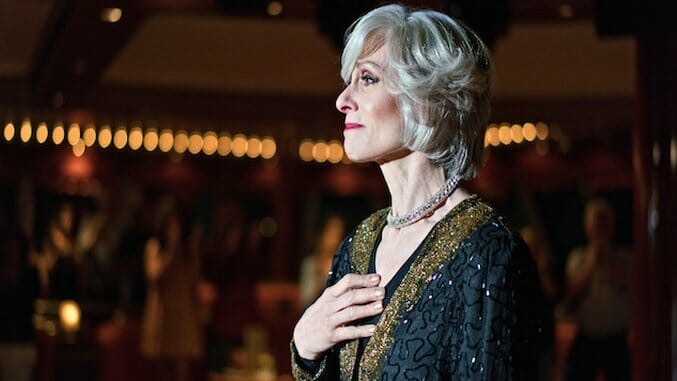A Toast to Judith Light, and to Transparent‘s Glorious Season Finale
(Episodes 3.09 and 3.10)
Amazon
In “Off the Grid,” the penultimate episode of Transparent’s third season, the Pfeffermans’ sense of their relation to others suddenly splinters apart. Ali’s nitrous-fueled hallucinations inspire her research (“intersectionality as the Holy Other”) and, from Leslie, her retreat; in Overland Park, Kansas, where she joins Josh for barbecues and sunset walks, her brother finds that he’s Colton’s biological father, but not, as it happens, his dad. Sarah’s dominatrix flees for Boulder, and she’s unable to replace her with Len; Maura’s doctor stops her medical transition on account of her 70-year-old heart; Shelley’s is broken, too, by Buzz’s dissimulations. “What I will not accept is being lied to,” she says, recalling the series’ entire arc in a single declaration. “Never again.”
Scattering ashes and hitting the road, drinking, dancing, and raging, the Pfeffermans spend much of “Off the Grid” cutting ties with those outside their fold: It’s telling, for instance, that the episode opens with Raquel submerged in the ritual bath, as if cleansing herself of their influence. It’s disappointment, discontent, that propels their actions—including Maura’s first dalliance with a man—but there’s also a potent feeling of homecoming afoot, a family assembling around the hearth. “No one can see me like you do,” Yoko Ono sings, against glimpses of Ali, Maura, and Sarah at their most contemplative. “No one can see you like I do.”
This has been the central thrust of Transparent this season. As I wrote of “To Sardines and Back” and “Just the Facts,” Jill Soloway’s gossamer reflections on the content of kinship suggest that “family itself is home, even as its architecture changes.” On the cruise, in “Exciting and New,” there’s no respite from pain—or “the size of my fear,” as Maura says so poetically—but there is the recognition that each Pfefferman bears it: the weight of past trips, past sicknesses, past holidays, past fights. Though Josh is so bereft that he begs off from dinner, and later castigates Ali for the closeness they’ve built, the Pfeffermans seek the familiar as expatriates might, gathering together to speak their common tongue as if foreigners in a far country.
-

-

-

-

-

-

-

-

-

-

-

-

-

-

-

-

-

-

-

-

-

-

-

-

-

-

-

-

-

-

-

-

-

-

-

-

-

-

-

-








































